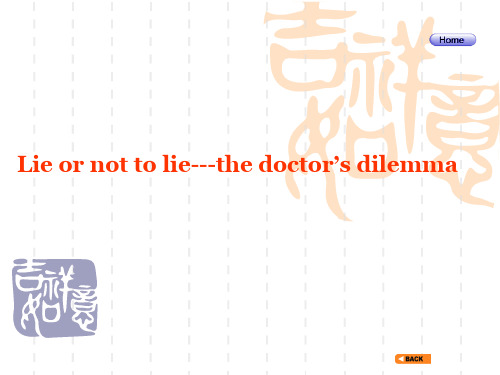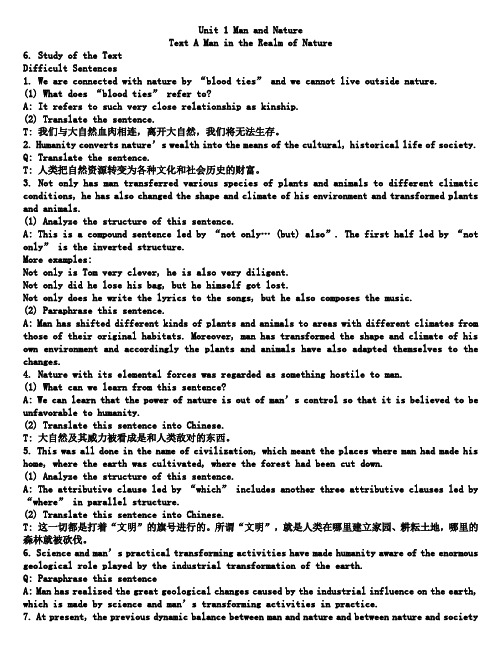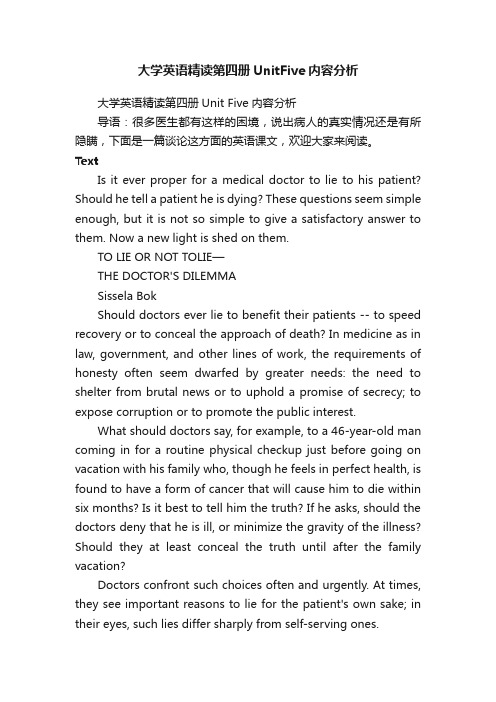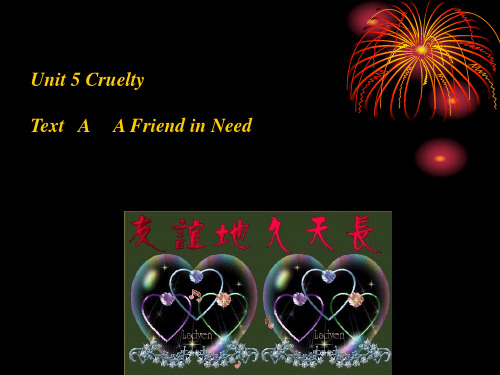新世纪大学英语第四册第五单元语言点解析
大学英语第四册第5课解析

After Reading NhomakorabeaDefinition of a White Lie
A white lie is a lie that is considered to be justified, or even praiseworthy, if it is in the interests of the person or people to whom it is told. Quite often, a doctor’s lie is thought to be a case in point.
Before Reading
Global Reading Detailed Reading
After Reading
Pair Work on White Lies
1. Compile a list of situations in which you think a white lie would be justified. 2. Recall occasions on which you have told a white lie and explain why it was
When treating seriously ill patients, many doctors think that it is best not to tell them the truth about their condition. These doctors sincerely believe that they have good reasons to tell lies for the patients’ own benefit.
▪ quack 江湖医生
Veterinarian (Vet) Quack
秦秀白《新世纪大学英语综合教程(4)》(全文翻译 Unit 5)【圣才出品】

三、全文翻译Text A声誉梅尔文·霍华兹1声誉极像一个追逐自己尾巴的动物,抓住了以后除继续穷追不舍外,再也不知道还能做什么。
声誉以及随之而来的名气迫使名人陷入穷途末路。
真有点讽刺意味,不是吗?2名人有名多因有一技之长,如唱歌、跳舞、绘画、写作等等。
成功的表演者展示出一种风格,获得声誉。
而且这种声誉常常使这位表演者确信,必须把这种风格发扬光大,因为这就是大众所需要和喜爱的。
可是随着时间的推移,如果歌手年复一年地用老调唱老歌,画师画千篇一律的风景或画像,演员反复饰演同一角色,他们势必都会感到厌烦。
由于公众的要求,艺人竟变成了自己功名的奴隶。
倘若他或她想改变笔调、舞步、唱腔的话,大众就会弃他而去,转而把那飘忽不定的声誉赐予他人,一段时间后再转给他人,这样不停地转下去。
3一个人有了名誉,就有了名气,就能赢得忠实的追捧者的高度关注,在任何领域都是这样。
一个表演者很容易相信,自己的成就当真和新闻报道的一样大。
可是大多数人、大多数艺人并没有得到美誉和财富。
那些失败的表演者又如何呢?其他任何一个失败者又会如何呢?奇怪的是,对许多人而言,失败往往就是对失败的回报!有些人对你表示怜悯,他们庆幸自己不是你。
你的亲朋好友也会降低对你的期望,使你不必去和那些比你有天赋并获得成功的人较量。
他们会找出种种借口来解释你不能功成名就的原因:你太敏感了呀;你对金钱没有兴趣呀;你对声誉所能带来的权利不感兴趣呀;因为声望要使你丧失隐私,所以你不感兴趣呀;等等。
所有这些都是借口,但对失败者或假装不在意自己失败的人来说,却是安慰。
4历史充分证明,有些人在一生的某个时刻遭遇失败,的确能激发他们更加努力地追求成功,继续对自己充满信心。
美国小说家托马斯·沃尔夫的第一部小说《安琪儿,往家里看吧!》被退稿39次才得以出版,才使他开始了他的写作生涯并赢得了声誉。
贝多芬不屈服于他残暴、专横的父亲,还忍气吞声当过乐师,但终于克服一切,成为世界上最伟大、最著名的音乐家。
新世纪大学英语_综合教程4_unit5_答案

新世纪大学英语综合教程第4册unit4课后答案新世纪大学英语综合教程第4册unit6课后答案新世纪大学英语综合教程第4册unit5课后答案课后答案 2010-04-20 13:48:47 阅读155 评论0 字号:大中小订阅UNIT 5填单词</Key>- <Answers>- <Blank id="1"><Answer id="1">fortune</Answer></Blank>- <Blank id="2"><Answer id="1">dull</Answer></Blank>- <Blank id="3"><Answer id="1">chased</Answer></Blank>- <Blank id="4"><Answer id="1">launched</Answer></Blank>- <Blank id="5"><Answer id="1">finance</Answer></Blank>- <Blank id="6"><Answer id="1">reputation</Answer></Blank>- <Blank id="7"></Blank>- <Blank id="8"><Answer id="1">publicity</Answer> </Blank>- <Blank id="9"><Answer id="1">sufficiently</Answer> </Blank>- <Blank id="10"><Answer id="1">sympathy</Answer> </Blank>- <Blank id="11"><Answer id="1">target</Answer></Blank>- <Blank id="12"><Answer id="1">educate</Answer> </Blank>- <Blank id="13"><Answer id="1">commerce</Answer> </Blank>- <Blank id="14"><Answer id="1">alike</Answer></Blank>- <Blank id="15"><Answer id="1">bored</Answer></Blank>- <Blank id="16"><Answer id="1">audiences</Answer> </Blank>- <Blank id="17"></Blank>- <Blank id="18"><Answer id="1">assure</Answer></Blank>填词组- <Blank id="1"><Answer id="1">thrown out</Answer></Blank>- <Blank id="2"><Answer id="1">and so on</Answer></Blank>- <Blank id="3"><Answer id="1">for dear life</Answer></Blank>- <Blank id="4"><Answer id="1">dedicate himself to</Answer> </Blank>- <Blank id="5"><Answer id="1">was tired of</Answer></Blank>- <Blank id="6"><Answer id="1">turn away</Answer></Blank>- <Blank id="7"><Answer id="1">hang on</Answer></Blank>- <Blank id="8"><Answer id="1">for the sake of</Answer> </Blank>完形填空Answers>- <Blank id="1"><Answer id="1">chase</Answer></Blank>- <Blank id="2"><Answer id="1">reputation</Answer></Blank>- <Blank id="3"><Answer id="1">dedicate</Answer></Blank>- <Blank id="4"><Answer id="1">reward</Answer></Blank>- <Blank id="5"><Answer id="1">sufficiently</Answer></Blank>- <Blank id="6"><Answer id="1">measured</Answer></Blank>- <Blank id="7"><Answer id="1">assure</Answer></Blank>- <Blank id="8"><Answer id="1">Momentary</Answer></Blank>- <Blank id="9"><Answer id="1">celebrity</Answer></Blank>- <Blank id="10"><Answer id="1">target</Answer></Blank>- <Blank id="11"><Answer id="1">frank</Answer></Blank>- <Blank id="12"><Answer id="1">liberty</Answer></Blank>- <Blank id="13"><Answer id="1">illusory</Answer></Blank>- <Blank id="14"><Answer id="1">regard</Answer></Blank>句子翻译<pre><font face="Palatino Linotype">1. He attempted to save the enterprise which was on the verge of collapse but failed. 2. The president has announced that he will not seek re-election at the end of his first term. 3. The young teacher is skilled at motivating his students to study hard. 4. She loves giving parties and does so whenever she can find an excuse. 5. I’m afraid that you’ll have to compete with at least fifty people for an administrative post in this company. 6. To be frank, I don’t think you stand a good chance of getting promoted even if you are loyal to the company. 7. It was obvious that his speech aroused the sympathy of the audience for the victims of the earthquake. 8. Though he has repeatedly assured me of his ability to promote our company’s products, I’ll give him anothe r interview before hiring him. 9. The company’s investment ended in failure due to the wrong strategic decisions of the general manager and so the board of directors decided to throw him out. 10. I know you are tired but try to hang on a little bit longer. We will reach the peak in half an hour.</font></pre>短文翻译<pre><font face="Palatino Linotype">• Many people want to be famous because fame can bring them both honor and respect from the public. In most cases, fame can also help them gain wealth. But, after all, very few people can really become famous while most people, including most artists, are unlikely to become famous. It is true that some failure for some people at certain times in their lives does motivate them to strive even harder so as to achieve final success. For example, Thomas Edison, the famous American inventor, had tried hundreds of materials before he finally found the suitable fuse for the electric bulb. However, unfortunately, for most people failure is the end of their struggle. Therefore, in my opinion, success is one thing and fame is another. As long as you have tried your best, you’re already successful whether you are famous or not.</font>作文范文- <center><B>Fame – Good or Evil</B></center>Fame has always been pursued by many people for the advantages it brings about. Fame can assure one of a high social status, high regard, great admiration, etc. Fame can also bring one wealth as a celebrity has more chances to earn big money. Besides, the applauses and flowers from the fans may boost one's self-confidence and increase one's sense of fulfillment. However, fame can ruin one's life, too. It deprives one of his privacy. As a public figure, he is often chased by fans and journalists, and his private life never escapes the media's attention or public curiosity. Fame also places one under great pressure. He has to work in line with public expectations and thus becomes the slave of his own success. So fame is a double-edged sword. I don't seek fame and I don't envy those who are famous. I highly appreciate what the American poet Henry Wadsworth Longfellow says about fame: "The talent of success is nothing more than doing well whatever you do without a thought of fame".。
新世纪大学英语Book4语言点U1、U3、U5、U7

Unit 1 Man and NatureText A Man in the Realm of Nature6. Study of the TextDifficult Sentences1. We are connected with nature by “blood ties” and we cannot live outside nature.(1) What does “blood ties” refer to?A: It refers to such very close relationship as kinship.(2) Translate the sentence.T: 我们与大自然血肉相连,离开大自然,我们将无法生存。
2. Humanity converts nature’s wealth into the means of the cultural, historical life of society. Q: Translate the sentence.T: 人类把自然资源转变为各种文化和社会历史的财富。
3. Not only has man transferred various species of plants and animals to different climatic conditions, he has also changed the shape and climate of his environment and transformed plants and animals.(1) Analyze the structure of this sentence.A: This is a compound sentence led by “not only… (but) also”. The first half led by “not only” is the inverted structure.More examples:Not only is Tom very clever, he is also very diligent.Not only did he lose his bag, but he himself got lost.Not only does he write the lyrics to the songs, but he also composes the music.(2) Paraphrase this sentence.A: Man has shifted different kinds of plants and animals to areas with different climates from those of their original habitats. Moreover, man has transformed the shape and climate of his own environment and accordingly the plants and animals have also adapted themselves to the changes.4. Nature with its elemental forces was regarded as something hostile to man.(1) What can we learn from this sentence?A: We can learn that the power of nature is out of man’s control so that it is believed to be unfavorable to humanity.(2) Translate this sentence into Chinese.T: 大自然及其威力被看成是和人类敌对的东西。
大学英语精读第四册UnitFive内容分析

大学英语精读第四册UnitFive内容分析大学英语精读第四册Unit Five内容分析导语:很多医生都有这样的困境,说出病人的真实情况还是有所隐瞒,下面是一篇谈论这方面的英语课文,欢迎大家来阅读。
TextIs it ever proper for a medical doctor to lie to his patient? Should he tell a patient he is dying? These questions seem simple enough, but it is not so simple to give a satisfactory answer to them. Now a new light is shed on them.TO LIE OR NOT TOLIE—THE DOCTOR'S DILEMMASissela BokShould doctors ever lie to benefit their patients -- to speed recovery or to conceal the approach of death? In medicine as in law, government, and other lines of work, the requirements of honesty often seem dwarfed by greater needs: the need to shelter from brutal news or to uphold a promise of secrecy; to expose corruption or to promote the public interest.What should doctors say, for example, to a 46-year-old man coming in for a routine physical checkup just before going on vacation with his family who, though he feels in perfect health, is found to have a form of cancer that will cause him to die within six months? Is it best to tell him the truth? If he asks, should the doctors deny that he is ill, or minimize the gravity of the illness? Should they at least conceal the truth until after the family vacation?Doctors confront such choices often and urgently. At times, they see important reasons to lie for the patient's own sake; in their eyes, such lies differ sharply from self-serving ones.Studies show that most doctors sincerely believe that the seriously ill do not want to know the truth about their condition, and that informing them risks destroying their hope, so that they may recover more slowly, or deteriorate faster, perhaps even commit suicide. As one physician wrote: "Ours is a profession which traditionally has been guided by a precept that transcends the virtue of uttering the truth for truth's sake, and that is 'as far as possible do no harm.'"Armed with such a precept, a number of doctors may slip into deceptive practices that they assume will "do no harm" and may well help their patients. They may prescribe innumerable placebos, sound more encouraging than the facts warrant, and distort grave news, especially to the incurably ill and the dying.But the illusory nature of the benefits such deception is meant to produce is now coming to be documented. Studies show that, contrary to the belief of many physicians, an overwhelming majority of patients do want to be told the truth, even about grave illness, and feel betrayed when they learn that they have been misled. We are also learning that truthful information, humanely conveyed, helps patients cope with illness: helps them tolerate pain better, need less medicine, and even recover faster after surgery.Not only do lies not provide the "help" hoped for by advocates of benevolent deception; they invade the autonomy of patients and render them unable to make informed choices concerning their own health, including the choice of whether to be patient in the first place. We are becoming increasingly aware of all that can befall patients in the course of their illness when information is denied or distorted.Dying patients especially -- who are easies to mislead andmost often kept in the dark -- can then not make decisions about the end of life: about whether or not they should enter a hospital, or have surgery; about where and with whom they should spend their remaining time; about how they should bring their affairs to a close and take leave.Lies also do harm to those who tell them: harm to their integrity and, in the long run, to their credibility. Lies hurt their colleagues as well. The suspicion of deceit undercuts the work of the many doctors who are scrupulously hones with their patients; it contributes to the spiral of lawsuits and of "defensive medicine," and thus it injures, in turn, the entire medical profession.Sharp conflicts are now arising. Patients are learning to press for answers. Patients' bills of rights require that they be informed about their condition and about alternatives for treatment. Many doctors go to great lengths to provide such information. Yet even in hospitals with the most eloquent bill of rights, believers in benevolent deception continue their age-old practices. Colleagues may disapprove but refrain from objecting. Nurses may bitterly resent having to take part, day after day, in deceiving patients, but feel powerless to take a stand.There is urgent need to debate this issue openly. Not only in medicine, but in other professions as well, practitioners may find themselves repeatedly in difficulty where serious consequences seem avoidable only through deception. Yet the public has every reason to be wary of professional deception, for such practices are peculiarly likely to become deeply rooted, to spread, and to erode trust. Neither in medicine, nor in law, government, or the social sciences can there be comfort in the old saying, "What you don't know can't hurt you."New Wordsdilemman. a situation in which one has to make a choice between two equally unsatisfactory things; a difficult choice 窘境,进退两难benefitvt. do good to 有益于recoveryn. the process or fact of getting back to a former state of good health; the state of recovering or being recoverd 痊愈;复得concealvt. hide, keep from being seen or known 隐瞒linen. a business, profession, trade, etc. 行业dwarfvt. cause to appear small by comparison 使矮小,使相形见绌n. a person, animal, or plant of much less than the usual size 矮小;矮小的动(植)物sheltervi. take shelter; find protection 躲避vt. provide shelter for; protect 掩蔽;庇护brutala. cruel, severeupholdvt. support 支撑;维护secrecyn. the practice of keeping secrets; the state of being secret exposevt. disclose; leave uncovered or unprotected 揭露;暴露corruptionn. dishonesty; immoral behaviour 腐化,道德败坏promotevt. help to grow or develop; raise in rank, condition, or importance 促进,推进;提升checkupn. a general medical examinationminimizevt. reduce to the smallest possible amount or degreegravityn. the quality of being serious critical 严重性confrontvt. meet face to face; oppose (勇敢地)面对;对抗urgentlyad. in an urgent manner 紧急地,急迫地urgent a.self-servinga. serving one's own interests; seeking advantage for oneself 利已的recovervi. get well; get back to a normal conditiondeterioratev. (cause to ) become worse (使)恶化suiciden. the act of killing oneselfphysiciann. a doctor of medicine 内科医生traditionallyad. by tradition; in a traditional mannerpreceptn. a rule of moral conduct; maxim 戒律;格言preceptvt. rise above or go beyond the limits of; surpass 超越virtuen. goodness or moral excellence; a good quality 美德;优点uttervt. speak; give outdeceptivea. deceiving or misleading; meant to deceiveinnumerablea. too many to be countedplacebon. substance given instead of real medicine to a patient for psychological effect 安慰剂warrantvt. justify; authorize; guarantee 使有(正当)理由;授权(给);担保distortvt. give a false account of; twist out of the usual shape 歪曲;弄歪gravea. serious; requiring careful consideration 严重的;严肃的'incurablyad. beyond cureillusorya. deceptive and unreal; based on an illusion 虚幻的deceptionn. deceiving or being deceived; a trick intended ot deceive 欺骗;诡计documentvt. prove or support with documents 用文件证明contrarya. completely different or wholly opposed 相反的;对抗的overwhelminga. too many, too great, or too much to be resisted 势不可挡的;压倒之势的betrayvt. be unfaithful to; deceive 背叛truthfula. truehumanelyad. tenderly, kind-heartedly 仁爱地;人道地toleratevt. allow or endure with protest 容忍advocaten. person who speaks for an idea, way of life, etc. 拥护者,倡导者benevolenta. intending or showing good will, kindly, friendly 仁慈的invadevt. enter (a country) with armed forces in order to attack; violate, interfere with 侵犯autonomyn. (the right of) self-government; freedom to determine one's own actions, behavior, etc. 自治(权);自主rendervt. cause to beinformeda. having knowledge or information; having and using suitable knowledge 了解情况的;有见识的concerningprep. about, with regard toincreasinglyad. more and more all timebefall( befell, befallen)vt. (use. sth. bad ) happen to (sb.) 降临到……头上integrityn. honesty or sincerity; wholeness 诚实,正直;完整credibilityn. the quality of being believable; trustworthiness 可靠性;可信colleaguen. an associate; fellow worker or member of a profession or organization 同事suspicionn. doubt; mistrust 怀疑deceitn. deception; a dishonest trick 欺骗undercutvt. undermine; weaken 暗中破坏;削弱scrupulouslyad. carefully; conscientiously 一丝不苟地spiraln. a curved shape which winds round; a continuous and expanding increase or decrease 螺旋(形);盘旋上升(或下降) lawsuitn. a noncriminal case in a court of law 诉讼(案件)injurevt. cause physical harm to; damagearise (arose)vi. move or go upward; come into existence 上升;出现billn. 法案;议案;账单alternativen. a choice between two or more things; any of the things to be chosen 抉择;可供选择的东西treatmentn. a substance or method used in treating someone medically 治疗;疗法eloquenta. having the power of expressing one's feeling or thoughts with grace and force 雄辩的disapprovevt. consider not good or not suitable; have or express an opinion against 不赞成refrainvi. hold oneself back; keep oneself (from doing sth.) 忍住;戒除objectvi. be against sth. or sb. 反对objection n.bitterlyad. sharply severelydeceivevt. cause (sb.) to believe sth. that is false 欺骗debatevt. argue about (sth.) in an effort to persuade other people 辨论issuen. a question that arises for discussion 问题;争端practitionern. a professional man, esp. in medicine or in law 开业者(尤指医生、律师等)consequencen. result; importance 后果;重要性avoidablea. that can be prevented from happeningwarya. cautious; in the habit of looking out for possible danger or trouble 谨慎的;谨防的erodevt. wear away; eat into 腐蚀sayingn. a well-known wise statement; proverb 格言;谚语Phrases & Expressionsgo on (a trip, vacation)depart for the purpose ofat timesoccasionally; now and then 间或;有时in one's eyesin one's opinionfor one's (own) sakefor one's own benefit 为了某人自己的利益slip intofall into; enter (esp. through carelessness) 陷入contrary toopposite to; despitein the first placefirstlyin the course of duringduringin the darkuninformed; ignorant 不知情,蒙在鼓里bring to a closeend 结束,终止take leave (of)say goodbye (to)in the long runin the end; ultimately 从长远的观点看;最终go to great lengthsdo anything possible, however dangerous, unpleasant, wicked, etc. 不遗余力refrain fromnot do , stopday after dayeach daytake a/ one's standdeclare one's position, loyalty, opinions, etc., and be prepared to fight (for these opinions, etc.)表明立场、意见等。
新编大学英语第四册 Unit 5

He was loudly dressed. 他穿着花俏。
Para.3 Q: What was his manner like?
1.He played a generous game(牌风好). 2.He did not talk very much but what he said was sensible (明智的). 3.He had a quiet, dry humor. (沉静幽默) 4.His voice was gentle. 5.His smile was benign(和蔼可亲的)...
2
2~3
3
4~51
1. For thirty years now I have been studying my_____(同胞). I do not know very much about them. I_______(耸耸肩)when people tell me that their_______(第一印象)of a person are always right. fellowmen shrug my shoulders first impressions
Cultural background
Bridge 桥牌
Bridge, card game played with 52 cards by four players in two partnerships. Bridge probably originated in the Middle East in the 19th
The experience of climbing Mount Qomolangma left me with a deep impression. 攀登珠穆朗玛的经历给我留下了很深的印象。
新世纪大学英语综合教程4Unit5课后习题答案

新世纪大学英语综合教程4 Unit 5 课后习题答案Checking Your VocabularyWord Detective:A/(1)e (2)d (3)g (4)a (5)c (6)h (7)b (8)f Working with Words and Expression:A/(1)fortune (2)dull (3)chased (4)launched (5)finance (6)reputation (7)liberty (8)publicity (9)sufficiently (10)sympathy (11)target (12)educate (13)commerce (14)alike (15)bored (16)audiences (17)regard (18)assureB/(1)thrown out (2)and so on (3)for dear life (4)dedicate himself to (5) was tired of (6)turn away (7)hang on (8)for the sake of Increasing your word power:A/automation housekeeper babysitter mass-productionbook-keeping self-destruction dry-cleaning window-shopping editor wordprocessorB/1.reached/secured 2.achieved/attained 3.attained/reached4.reach/secure5.achieved/realized/fulfilled6.fulfill/meet/satisfyC/1.dull petitive 3.same 4.momentary 5.specific6.sufficient7.cruel8.humble9.famous 10.reasonable Grammar Review:A/1.(real)subject 2.object to the verb "make" 3.predicate 4.attribute modifying "opportunity" 5.object complement 6.adverbial of purpose 7.adverbial of result 8.predicative 9.attribute modifying"person"10.independent elementB/1.To become a famous writer 2.to take traveler's checks 3.to employ a young engineer 4.take the machine apart 5.To understand the situation completely 6.to rise higher in position 7.to find that the train had left 10 minutes before 8.to apply for a known job opening 9.to make trouble 10.To be more exactCloze:1.chase 2.reputation 3.dedicate 4.reward 5.sufficiently 6.measured 7.assure 8.Momentary 9.celebrity 10.target 11.frank 12.liberty 13.illusory 14.regardTranslation:1.He attempted to save the enterprise which was on the verge of collapse but failed.2.The president has announced that he will not seek re-election at the end of his first term.3.The young teacher is skilled at motivating his students to study hard.4.She loves giving parties and does so whenever she can find an excuse.5.I'm afraid that you'll have to compete with at least fifty people for an administrative post in this company.6.To be frank,I don't think you stand a good chance of getting promoted even if you are loyal to the company.7.It was obvious that his speech aroused the sympathy of the audience for the victims of the earthquake.8.Though he has repeatedly assured me of his ability to promote our company's produce,I'll give him another interview before hiring him.9.The company's investment ended in failure due to the wrong strategic of the general manager and so the board of directors decided to throw him out.10.I know you are tired but try to hang on a little bit longer.We will reach the peak in half an hour.。
全新版大学英语综合教程第四册课件Unit5精品文档

1. Language study 2. Ask questions to check their understanding of the text. 3. Text organization
1. Language study
2. Ask questions 源自o check their understanding of the text.
(1). Do you think there is some truth in the saying, “You can’t judge a book by looking at its cover?” and explain. (Before asking the question, teacher may write down the saying on the blackboard and ask students what its meaning is to arouse their interest.)
playing computer games.
Does the narrator think our first impressions of a person are always right? Why or why not?
1. Language study
2. Ask questions to check their understanding of the text.
2. The essays he completed in the latter part of his life are of a piece with his earlier work.
Language Study
wrinkle:
- 1、下载文档前请自行甄别文档内容的完整性,平台不提供额外的编辑、内容补充、找答案等附加服务。
- 2、"仅部分预览"的文档,不可在线预览部分如存在完整性等问题,可反馈申请退款(可完整预览的文档不适用该条件!)。
- 3、如文档侵犯您的权益,请联系客服反馈,我们会尽快为您处理(人工客服工作时间:9:00-18:30)。
新世纪大学英语第四册第五单元语言点解析Language Points for Unit 51. publicity: n. public notice or attentione.g. We have planned an exciting publicity campaign with our advertisers.T:她的新剧作获得广泛宣传。
(=Her new play has attracted a lot of publicity.)Collocations:gain/get/receive publicity 取得名气;引人注目seek publicity 追求名气avoid public ity 避免引人注目extensive/wide publicity 广为宣传2. accompany: vt. go with someone or to be provided or exist at the same time as somethinge.g. Warships will accompany the convoy.He was accompanied on the expedition by his wife.3. adverse: a. having a negative or harmful effect on somethinge.g. So far the drug is thought not to have any adverse effects.T: 他的健康因气候影响而严重受损.(=His health was adversely affected by the climate.)CF: adverse, opposite & contrary这些形容词均含“相反的,对立的”意思。
adverse 通常指违害利益的、不友好的等,侧重分歧。
opposite 指位置、方向、行动或想法等完全相反。
contrary 一般指与某种主张、看法或行为等正好相反,隐含否定一方并不意味着肯定另一方的意味。
(Directions:) Fill in the blanks with the words above. Change the form where necessary.(1) ______ to popular opinion, I don't dye my hair! (contrary)(2) They received a lot of ______ publicity/criticism about the changes. (adverse)(3) His political position is _______ to ours. (opposite)(4) She's turned out to be the exact _______ of what everyone expected. (opposite)(5) The match has been cancelled due to ______ weather conditions. (adverse)(6) My father is a very calm person, but my mother is just the _____. (opposite)(7) ______ to all our expectations, he's found a well-paid job and a nice girlfriend. (Contrary)4. chase: v. follow rapidly in order to catche.g. The police car was going so fast, it must have been chasing someone.She was chasing (after) a man who had snatched her bag.T: 他追赶窃贼却未捉住。
(=He chased (after) the burglar but couldn't catch him.)Patterns:chase after fame 追求名望chase …out of 把……赶出5. ironic: a. using or expressing irony; full of ironye.g. It is ironic that although many items are now cheaper to make, fewer people can afford to buy them.T:发生这样的事情颇有讽刺意味。
(=This is a very ironic(al) thing to happen.)NB:ironic 是irony 的形容词形式,也可写为ironical,其副词形式为ironically, 意为“说反话地, 讽刺地”。
6. style: n. a way of doing something, especially one which is typical of a person, group of people, place or periode.g. His office is very special in style, with no decoration.T: 典型的英国生活方式(=a typically British style of living)Patterns:the latest style 最新款式in style 华丽地,时髦地lack style 缺乏风度7. portrait: n. a painting, photograph, drawing, etc. of a person or, less commonly, of a group of peoplee.g. She's commissioned an artist to paint her portrait/paint a portrait of her.T:(插入声音文件portrait)(=She had her portrait painted.)Collocations:make/paint a portrait 画肖像pose/sit for one’s portrait 摆好姿势让人画像a family portrait 全家画像a full-length portrait 全身像8. turn away: refuse to give one’s sympathy, help, or support toe.g. The civil administration promises that they would not turn away anyone who comes to therelief centre for help.T: 你怎么能对一个受虐待的孩子不闻不问呢?(=How can you turn away from the child that is being cruelly treated?9. momentary: a. lasting for a very short timee.g. There was a momentary pause.T: 瞬间的迟疑(=a momentary hesitation)10. fortune: n.1). a large amount of money, goods, property, etc.e.g. She inherited a fortune from her grandmother.(=She pursued her fortune in another country.)2). chance and the way it affects your lifee.g. The family's fortunes changed overnight.T:我们相信命运之神是会眷顾我们的。
(=We believe that Fortune is on our side.)CF: fortune, fate & luck这些名词均有“命运”或“运气”之意。
fortune 普通用词,指由机会或运气来决定的一种命运,如暗示一种比fate好的运气或一种愉快的未来。
fate较庄严用词,多指不幸的命运,暗示不可避免、令人畏惧和人的意志无法改变,宿命论色彩较浓。
luck 普通日常用词,指好的或坏的运气,多指好运气,有时也指成功或愉快的结局。
(Directions:) Fill in the blanks with the words above.(1) He seems to have had a lot of bad_____ in his life. (luck)(2) We want to decide our own ______. (fate)(3) Her_____ varied but she never lost courage. (fortunes)(4) It was just ______ that I asked for a job at the right time. (luck)(5) He had the (good) _______ to train with some of the world's top athletes. (fortune)(6) His _____ is now in the hands of the jury. (fate)(7) A stroke of ____has fallen to him. (luck)11. sympathy: n. (an expression of) understanding and care for someone else's sufferinge.g. The president has sent a message of sympathy to the relatives of the dead soldiers. T: 他怀着恻隐之心, 留那些无家可归的孩子过夜。
(=Out of sympathy for the homeless children he gave them shelter for the night.)12) (L.27 Para.3) expectations: n. when you expect good things to happen in the futuree.g. I have high expectations for this job.(=His parents have great expectations for his future.)Collocations:beyond one’s expectations 出乎意料地have high/great expectations for 对……的厚望fall short of expectations 辜负期望13. inability: n. lack of ability to do somethinge.g. Inability to use a computer is a serious disadvantage when you are applying for jobs. T: 这些显示出地方政府在解决能源问题上的无能。
